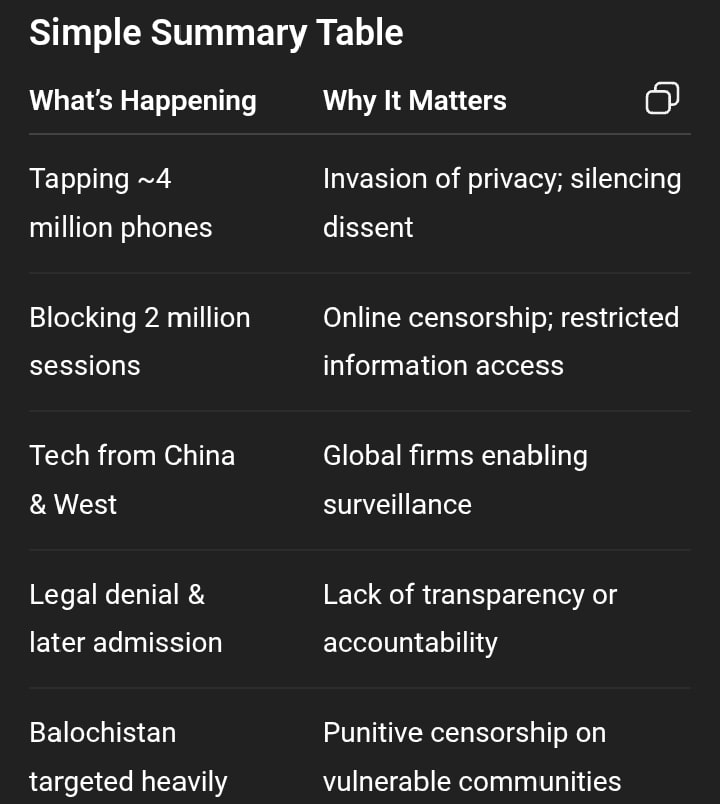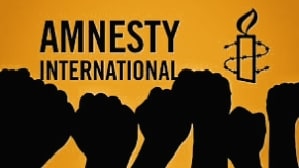Islamabad, September 9, 2025] — Amnesty International has released a startling report claiming that Pakistan is conducting widespread surveillance of its own citizens. The watchdog says state agencies have the ability to tap into millions of mobile phones and use a powerful internet firewall that works like China’s Great Firewall. This marks one of the most advanced surveillance systems in place outside of China.
A Dual Surveillance System
Amnesty describes Pakistan’s surveillance as a two-part system:
- Lawful Intercept Management System (LIMS): This tool allows intelligence agencies to listen in on calls and read text messages. It is capable of monitoring at least 4 million mobile phones simultaneously. It is reportedly mandatory for all four major mobile operators to connect their networks to this tool.
- Web Monitoring System (WMS 2.0): This Chinese-built firewall inspects internet activity. It can block up to 2 million web sessions at once. In other words, it can slow down or fully block access to websites and social media platforms.
Together, these systems give authorities the power to watch both online and offline activity in real time.
Hit on Free Speech and Privacy
This surveillance network has a “chilling effect,” according to Amnesty International. In simple words, people may feel too scared to speak freely or express dissent — not just online, but in everyday life.
The report notes that forces behind this monitoring are not only local. The web firewall comes from the Chinese firm Geedge Networks. Additionally, it relies on technology from Western firms: U.S.-based Niagara Networks, French firm Thales DIS (a part of Thales Group), and a Chinese state IT company. Canada’s Sandvine was reportedly utilized in an earlier version of the firewall.

For phone tapping, the system is made by Germany’s Utimaco and deployed through monitoring centers run by UAE-based Datafusion.
Legal Battle Sparks Revelation
This surveillance claim gained broader attention after a legal case in 2024. In the Islamabad High Court, Bushra Bibi, Imran Khan’s wife, submitted a petition. She accused authorities of leaking her private phone calls. In court, intelligence agencies and the defense ministry initially denied having any phone-tapping capability. However, Pakistan’s telecom regulator confirmed that LIMS was installed for “designated agencies” under pressure.
Targeted Censorship in Unrest-Prone Areas
Amnesty’s report also highlights targeted censorship. The government is blocking around 650,000 web links. It is preventing access to major social media platforms like YouTube, Facebook, and X.
Balochistan is one of the areas subject to the strictest restrictions. There have been numerous instances of internet outages and widespread unrest there. Local rights groups accuse the military of grave human rights violations—including enforced disappearances and killings—particularly against Baloch and Pashtun activists.
Expert Warning: A Dangerous Trend
Ben Wagner, a professor of human rights and technology at Austria’s IT:U university, told Reuters that while phone monitoring isn’t unusual, combining it with heavy internet filtering is rare—and deeply worrying. According to him, it represents a troubling shift in how governments can surveil their citizens.
Why It Matters: Key Takeaways
- Scale of surveillance: Monitoring millions of citizens in real time.
- Dual technology sources: Both Chinese and Western tech are in use.
- Suppression of dissent: Targets the right to free speech and private life.
- Regional impact: Balochistan faces the brunt of censorship and shutdowns.
- Global trend: Could inspire other governments to adopt similar tools.

The Road Ahead
Amnesty calls on Pakistan’s government to end this mass surveillance and to restore freedom of expression. The report urges safeguards to protect privacy and human rights. Beyond Pakistan, it raises alarm about how surveillance tools can be used—or misused—by states globally.
Final Thoughts
Pakistan’s use of a large-scale phone-tapping system combined with an aggressive internet firewall is alarming. It goes beyond traditional monitoring—this is a powerful way to control what people say and see. Fundamental rights like open information access and freedom of speech are put in jeopardy by this pervasive surveillance.
This report proves that technology alone is not neutral. Its use can protect—and at the same time, suppress.
For more



